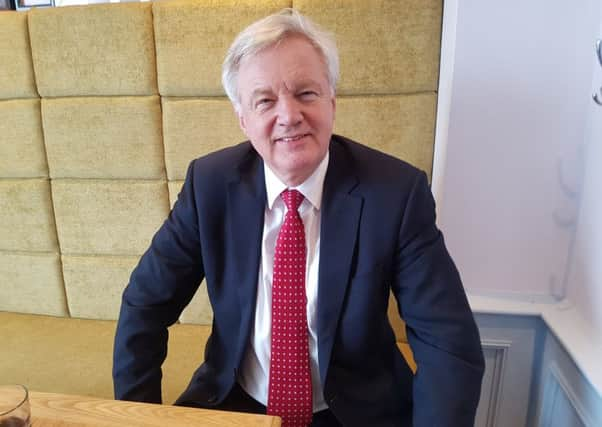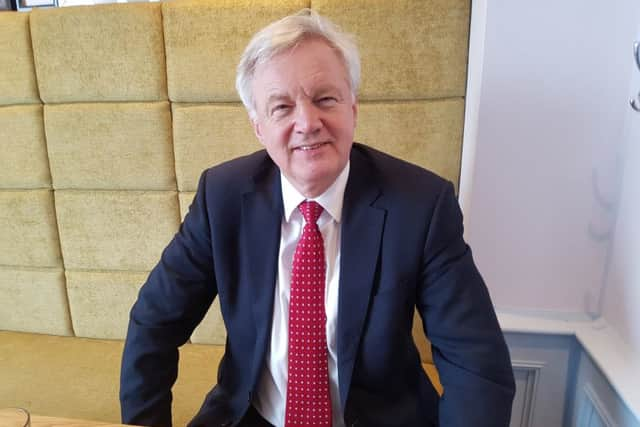Brexit talks might not start on June 19, David Davis suggests


The Brexit Secretary said the talks would take place that week, but not necessarily on the Monday.
The European Commission insisted it was “fully prepared and ready for the negotiations to start” - indicating any delay was on the British side.
Advertisement
Hide AdAdvertisement
Hide AdIn a hint at a changed approach, Mr Davis said “we will start down this process” by focusing on the divorce proceedings from the EU before moving on to trade.


Brussels has insisted talks on the so-called divorce, taking in issues including the fee the UK will have to pay to sever its ties, must make sufficient progress before any discussion on a future trade agreement could begin.
The UK Government wants the talks to take place in parallel during the Brexit process.
Theresa May had repeatedly said during the election campaign that the Brexit talks would start 11 days after the June 8 vote, using it as a warning that Jeremy Corbyn’s Labour were not ready for the negotiations.
Advertisement
Hide AdAdvertisement
Hide AdMr Davis indicated there could be a slight delay before he enters the negotiating chamber, in part because of the Queen’s Speech which was also due to take place on June 19 - although there has been speculation that could also be delayed.


He told Sky News: “It’s in the week of next week, basically, the first discussions.
“My permanent secretary is actually in Brussels today talking to them about the details.
“It may not be on the Monday because we also have got the Queen’s Speech that week and I will have to speak in that, and so on. “
Advertisement
Hide AdAdvertisement
Hide AdMr Davis added: “The first bit of it - Brussels want to do the so-called divorce proceedings first - the first bit of that includes European citizens in the UK.
“It includes money - they want to talk about that, we think it should come later - and Northern Ireland.
“The European citizens in the UK, we want to get on with as fast as possible because we don’t want people to be in a state of anxiety.”
Dismissing the prospect of a unilateral decision to guarantee the rights of EU citizens in the UK, he stressed he had “got to worry about the million or so Brits abroad”.
Advertisement
Hide AdAdvertisement
Hide AdAsked if he was now accepting Brussels’ timetable, as set out by chief negotiator Michel Barnier, Mr Davis said: “What we have said is we will start down this process but I will have some discussions with Mr Barnier about how we progress to the wider thing of the trade area.”
Mrs May’s weakened position in the House of Commons as a result of losing her majority has fuelled speculation the Tories would be forced to soften their stance on Brexit.
Mr Davis suggested he was open to co-operation with Labour on the issue but rejected the idea of the UK remaining in the single market.
The EU had made clear “you cannot stay in the single market and have control of your borders”, and “there’s no sign of them changing their position”.
Advertisement
Hide AdAdvertisement
Hide AdSenior Tories including Ruth Davidson and Chancellor Philip Hammond have stressed the need to put the economy first in the negotiations, which has been taken to suggest disagreement with the focus on curbing immigration.
Shadow international trade secretary Barry Gardiner also appeared to soften Labour’s stance on membership of the single market, acknowledging it was “an open question” whether Britain could remain inside the arrangement which would require maintaining freedom of movement.
Shadow Brexit Secretary Sir Keir Starmer said the Government was wrong to take the option off the table.
But shadow foreign secretary Emily Thornberry said it was “difficult to envisage” how single market membership could be retained.
Advertisement
Hide AdAdvertisement
Hide AdSir Keir told BBC Radio 4’s World at One: “What we criticised the government for was simply sweeping options off the table before they even started the negotiations.”
He added: “It’s clear from the outcome of the referendum that so far as the UK is concerned there’s got to be some change to freedom-of-movement rules ... We would have to negotiate that.
“It may be that we could tighten it so that it only applies in relation to workers and to families.”
European Commission spokesman Alexander Winterstein said: “We are fully prepared and ready for negotiations to start.”
Advertisement
Hide AdAdvertisement
Hide AdHe could not say when contacts would move “from talks about talks to more detailed talks”.
He said: “This doesn’t depend entirely on us. We are fully prepared.”
Mrs May’s official spokesman said the Prime Minister remained committed to securing “the best possible deal for the whole of the UK”.
Asked whether Mrs May still believed leaving without a deal would be better than agreeing a bad deal, the spokesman said: “We are confident of securing a deal which is good for the whole of the UK.
“You obviously wouldn’t want to accept a deal which is worse than leaving without a deal.”